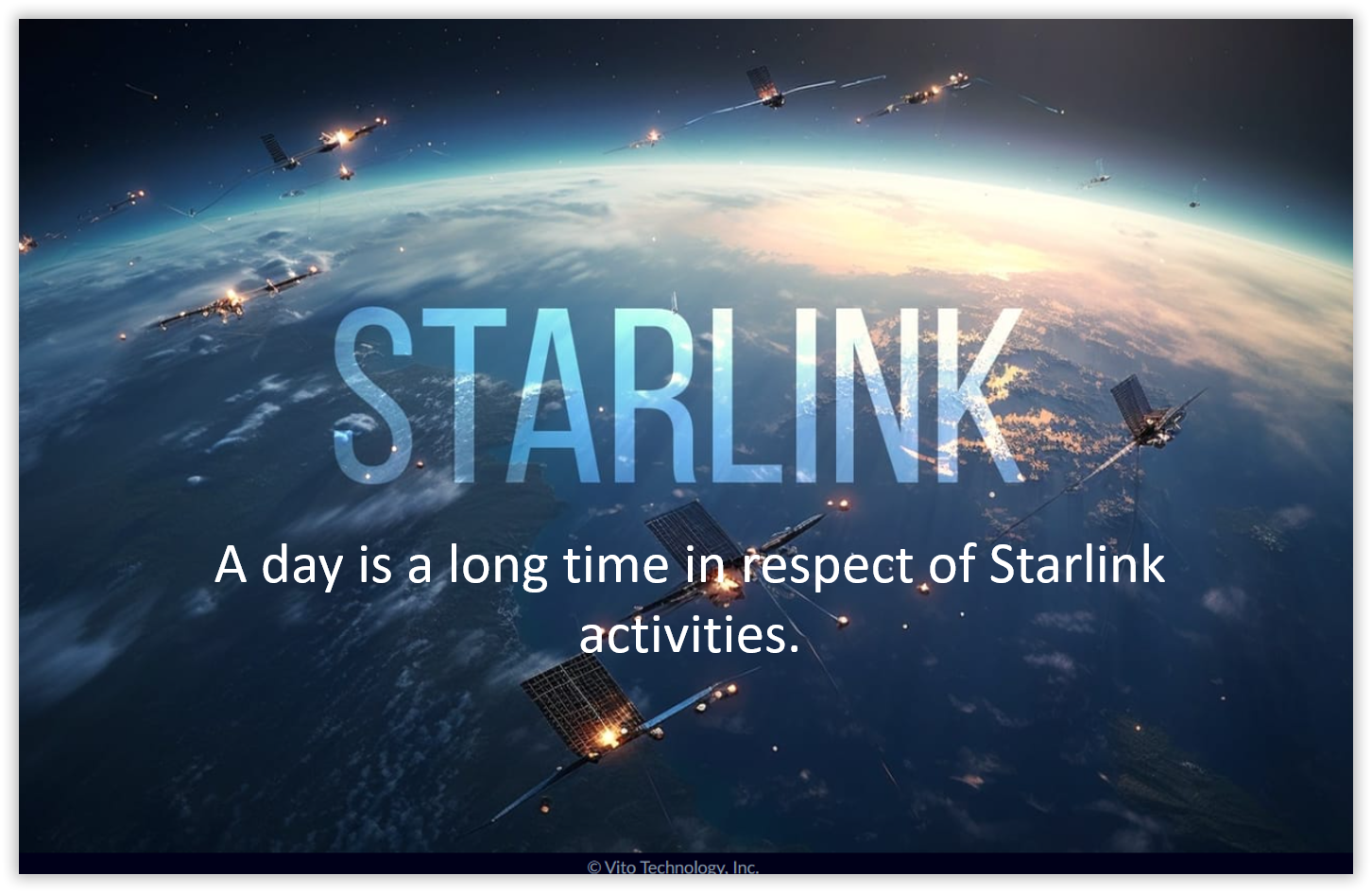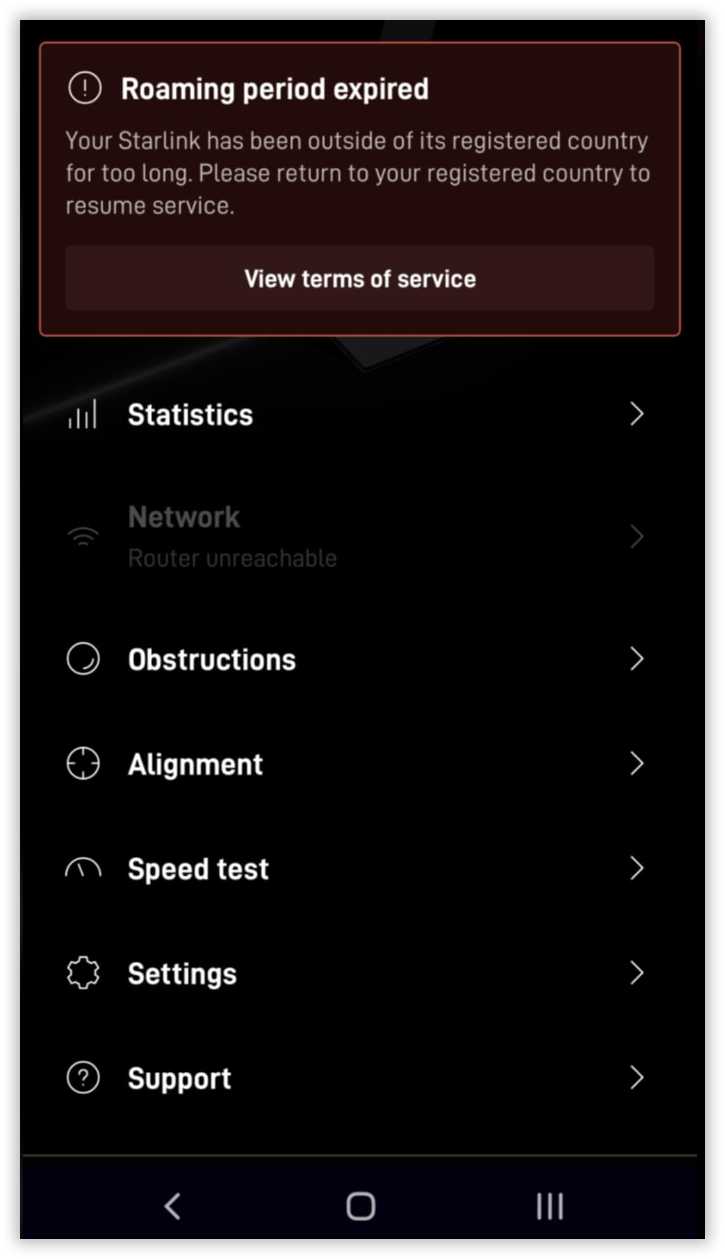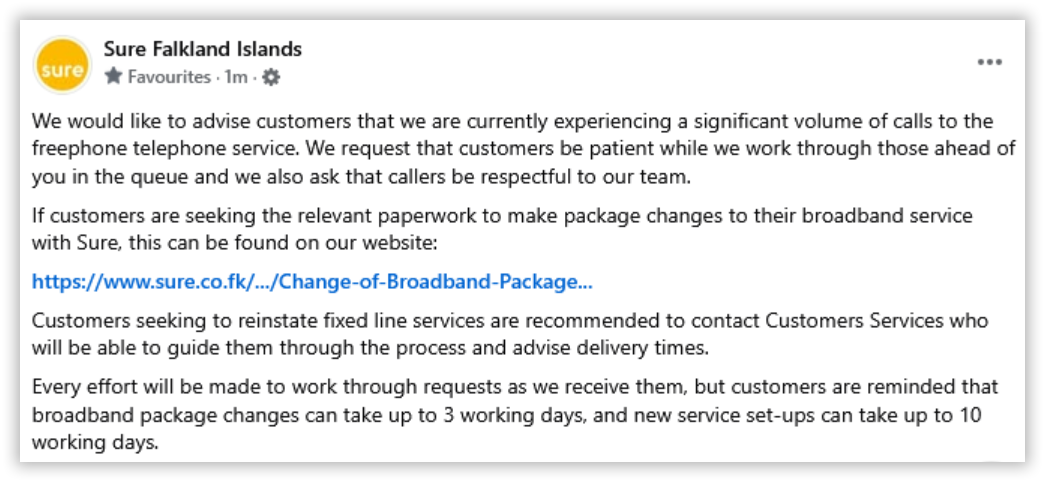
In yesterday’s (Thursday) OpenFalklands blog, I noted that while a week may seem long in politics, even a single day can feel like an eternity when it comes to Starlink developments in the Falklands.
And then, ‘Black Friday’ arrived on Friday, 7th of February!
This morning, some Falkland Islands Starlink users began experiencing service terminations as their 60-day roaming period expired, following Starlink’s Terms & Conditions.
 The Starlink message that triggered disconnection
The Starlink message that triggered disconnection

Illegal use of Starlink in the Falkland Islands.
Regardless of differing opinions, it is now an established fact that hundreds of Starlink terminals are in use in the Falkland Islands. The underlying reasons for this widespread adoption have been discussed extensively elsewhere and will not be reiterated here.
The high level of Starlink usage sparked a successful petition backed by 70% of the island’s population. This petition demanded both a reduction of the £5,400 FIG VSAT licence fee and formal approval for Starlink’s operation in the Falkland Islands.
In response, a Starlink Select Committee – comprising all of the island’s MLAs – convened from July to October 2024. The committee formally endorsed the petition’s demands, and the proposal was subsequently forwarded to the Falkland Islands Government (FIG) for implementation. However, the effective date for this approval has now been delayed until April.
Because Sure International holds an exclusive monopoly telecommunications licence, Starlink’s use in the islands is currently illegal. Nonetheless, this restriction has not prevented the widespread installation of hundreds of Starlink terminals, which remain unlicensed.
At this time, Starlink has not received an official government statement endorsing its use in the Falkland Islands – a prerequisite for adding the territory to Starlink’s approved list of service areas. As a result, using Starlink in the islands continues to be illegal and is considered a criminal offence.

The £5,400 FIG VSAT licence
In addition to the hundreds of unlicensed Starlink terminals operating on the islands, two groups of users are deemed “legal” by FIG – even though Starlink has not yet received formal permission to provide service in the Falkland Islands.
Starlink’s low Earth orbit (LEO) satellites are classified as very small aperture terminal (VSAT), a contentious categorisation. This definition was partly adopted to prevent islanders from self-provisioning internet services, thereby protecting Sure International’s telecommunications monopoly. Notably, the original legislation included an exemption for Falkland Islands government entities, allowing them to use Starlink without requiring a VSAT licence.
In 2024, several government departments took advantage of this exemption to install Starlink terminals – a move that garnered widespread support. Among the early adopters were FIG’s IT department and the Falkland Islands Development Corporation (FIDC). The KEMH is ‘earmarked’ for Starlink use, but it has yet to be installed.
That same year, rising demand from individuals and local businesses prompted the Communications Regulator to issue a limited number of FIG VSAT licences. Although the exact number remains undisclosed outside of government circles, estimates suggest that approximately fourteen licences were granted, including, among others, most of the island’s fishing companies, the inter-island ferry, and International Tours & Travel the local agent for LATAM flights.
It is important to emphasize that until FIG formally permits Starlink to operate in the Falkland Islands, any use of Starlink remains officially illegal. Consequently, neither of these two user groups are operating within a fully legal framework no differently than the hundreds of consumer ‘illegal’ users.
Questionable FIG-issued VSAT licences effectively permit Starlink usage from a FIG perspective, even though the service is still legally classified as a criminal act.
Starlink users who have paid £5,400 for a FIG VSAT licence are not, in any way, in a beneficial position compared to the hundreds of ‘illegal’ consumer users and cannot be considered to be so.
A message from the Communications Regulator was distributed this morning.
“Hello all
I’ve had reports this morning that some users have had their Starlink services disabled. If you have got back to me already with the below information, then this has already been passed to a team at Starlink who I understand will work to keep the service on.
If you haven’t got back to me with the information below, then please do so asap. I hope that you haven’t lost access and please be assured I am working to address this. So sorry for any inconvenience caused – which I am sure would be significant! Many thanks – and do give me a call if you need!”
There is currently no ethical or legal basis for Starlink to differentiate between supplying service to users holding FIG VSAT licences and the hundreds of unlicensed users on the Falkland Islands.
Requesting such differentiation is highly controversial. It would force Starlink into an ethically and legally precarious position – essentially endorsing a select group of users while its service remains a criminal offence under Falkland Islands law. In this context, holding a FIG VSAT licence does not change the legal status of Starlink usage.

An emergency needs emergency actions.
The sudden shutdown of Starlink services clearly qualifies as a National Emergency due to the widespread and unforeseen consequences such an action would have. Moreover, the government finds itself in a difficult position concerning holders of a FIG VSAT licence as they are threatened too.
For instance, if Sure Falkland Islands Intelsat satellite(s) were damaged by space debris – thereby cutting off the islands’ communications – the situation would undoubtedly be classified as a National Emergency.
Allowing the current situation to continue until April seems untenable, especially since many more Starlink users risk losing service as their roaming periods expire in the coming months. This issue could be resolved in a number of days if a National Emergency were declared.
During the COVID-19 crisis in 2020, a National Emergency was declared within half a day, demonstrating how quickly decisive action can be taken when circumstances demand it.
The Constitution states:
17. “Nothing contained in or done under the authority of a law shall be held to be inconsistent with or in contravention of any of the provisions of this Chapter, except for sections 2, 3, 4, 6(2)(a), 6(5), 6(6), 6(7) and 6(…), to the extent that the law authorises the taking of measures during any period of public emergency that are reasonably justifiable for addressing the situation in the Falkland Islands during that period.”
It is important to note that the declaration of a National Emergency can only be made by the Falkland Islands Government following an emergency meeting of the EXCO.
Surely, it must be to everyone’s benefit to get this situation resolved as soon as possible by permitting Starlink to operate in the Falkland Islands now?

Sure’s post this morning.

Chris Gare, OpenFalklands February 2025, copyright OpenFalklands

Excellent Chris.
Your vast amount of knowledge within the telecoms industry keeps us
up to date with every thing we need to know about starlink. Thank you.
Excellent post as usual Chris